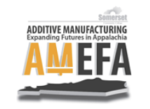Additive Manufacturing: Expanding Futures in Appalachia
Rural colleges are challenged with ways to open doors to advanced technology, novel applications, and innovations for local industries. This project at Somerset Community College (SCC) is designed to stimulate both technological growth in additive manufacturing (AM), known popularly as 3D printing, and employability of technician graduates in high-wage positions in high-poverty rural regions of southeast central Kentucky. This project is geared toward more than just new technologies and skills; its purpose is to create a whole new mindset, a mindset of creative thought and empowerment. Rural entrepreneurs will be able to create and manufacture products in ways that previously would not have been possible. The project has a four pronged approach that simultaneously will engage SCC and Kentucky Community and Technical College System (KCTCS) students; SCC faculty and staff; and the community including business, industry, local K-12 school district students/teachers, and other stakeholders. The project will serve as a model for other community colleges in Kentucky and across the nation to offer an accredited AM certificate. It involves long-term outreach and sustainability with program dissemination throughout the sixteen colleges of the Kentucky Community and Technical College System (KCTCS) and the K-12 Kentucky Department of Education (KDE). These community engagement efforts facilitate expansion using the existing KCTCS online network. Engagement of K-12 faculty and students in existing partner programs with Project Lead the Way and KDE will foster AM student recruitment. Several activities are designed to engage and recruit veterans. Due to the adaptability of AM technology, this project will offer education and employment opportunities to physically limited veterans re-entering the workforce. Evaluation activities will focus on informing the project and all stakeholders about successful practices while providing guidance about improving activities for maximum impact.
Initial activities will create a premier regional AM Innovation Laboratory and build awareness of AM with interactive demonstrations, hands-on workshops and presentations. A recently approved certificate program will provide pathways for students to employment. Students preparing to be technicians will connect with industry at college hosted workshops and conferences. Project personnel will attend AM and educator related conferences to facilitate awareness of AM and disseminate project results, as well as establish networking opportunities for future expansion. Students and regional industries will create new products, parts, and medical assisting devices in a few hours for comparatively small material costs. The project is based on work established by the NSF-funded National Resource Center for Material Technology Education and Research at Edmonds Community College, (0903112, 1400619) and current work of the college with 3D printing, scanning, and advanced modeling technologies. The project will provide an added focus on biomedical applications that support the advancement of technicians and existing industries in the rural Appalachian region served by the college. In addition, the project will make a targeted effort to recruit veterans. Medical practitioners and surgeons will have better tools and diagnostics with which to work. Veterans will have a new way to productively support themselves and their fellow soldiers.
About


Comments